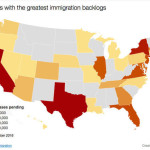Amid the debate over President Trump’s immigration policies, it still gets overlooked that hundreds of thousands of people are in limbo because our immigration courts are backed up for years. Now PBS sheds some light with an interview featuring the San Francisco-based immigration judge who leads the National Association of Immigration Judges, Dana Leigh Marks. For years, hers has been a strong voice for the judges, who are not “federal judges” but who work for the U.S. Justice Department.
It’s a great backgrounder and you can find it here:


